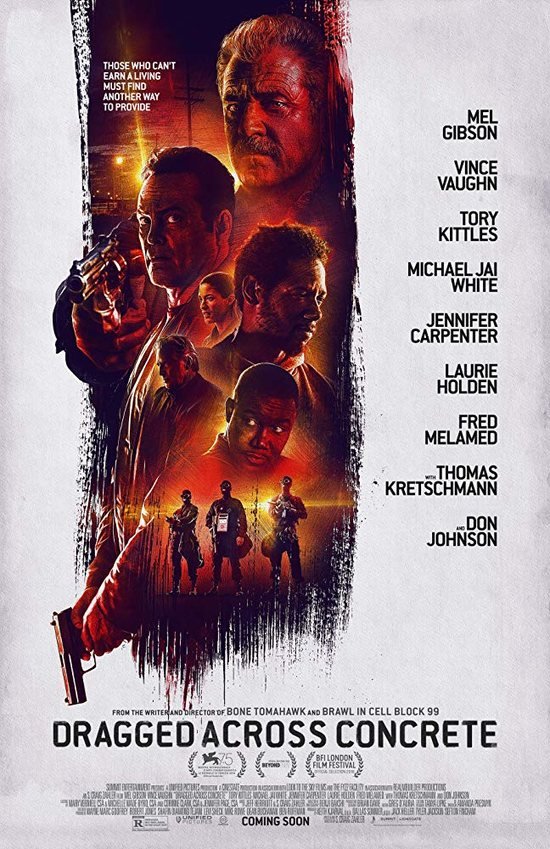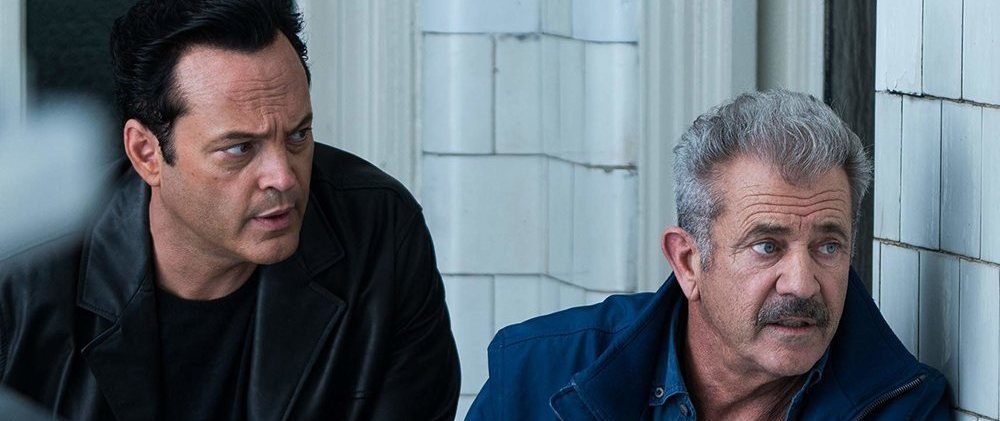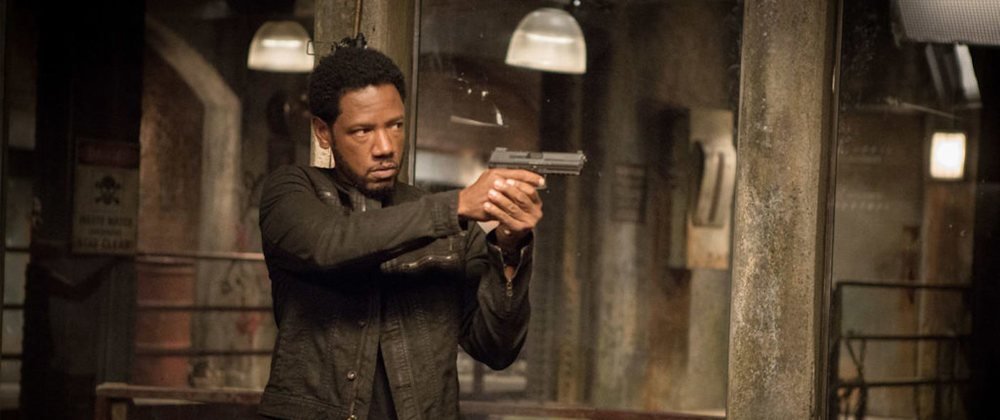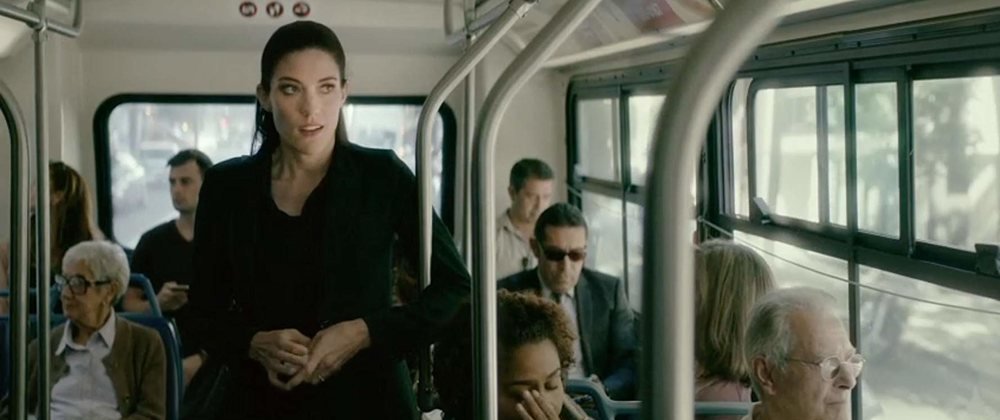DRAGGED ACROSS CONCRETE: Draw Your Own Hard-Boiled Conclusions
It's hard to tell how much of the controversy was intentional but Dragged Across Concrete has become the top debate topic of cult cinema in the first quarter of 2019. It represents a perfect storm of hot-button elements: take a star with a history of well-publicized bad behavior, pair him with a somewhat controversial co-star who is out-and-proud about his conservative stance and put them in a story about a pair of casually racist cops going rogue. Add in a producer who baits the press with remarks about targeting a "forgotten" audience plus a budding dark-film auteur who refuses to clarify the moral/political stances of his material and voila, you have instant controversy in the form of Dragged Across Concrete.So what's all the teeth-gnashing about? It begins with a pair of cops making a drug bust. Ridgeman (Mel Gibson) is the older of the two, sinking into bitterness over his lack of promotions and pay in his career. Lurasetti (Vince Vaughn) is the junior partner, as hard-nosed as his partner but a little more aspirational. Both are overly violent and casually racist in their work, an approach that comes back to bite them when their actions are captured by an anonymous citizen on video. A leak to the news causes a public furor that ends with both men suspended without pay. It's the last straw for Ridgeman, who has an ex-cop wife (Laurie Holden) afflicted with M.S. and a daughter (Jordan Ashley Olson) who's getting hassled in their downwardly-mobile neighborhood. He digs up some info on Vogelmann (Thomas Kretschmann), a crook who has come to town to pull off some sort of high-money deal. Lurasetti is initially reluctant to join in but financial pressures, including a potential marriage to girlfriend (Tattiana Jones), get him involved. The crook's job is much worse than they anticipated, leading them to cross paths with a secondary plotline involving Henry (Tory Kittles), an ex-con fresh out of prison who is recruited by old friend Biscuit (Michael Jai White) to work on Vogelmann's job.The resulting film fits the style that writer/director S. Craig Zahler has developed in previous films, tackling a hard-boiled genre premise in a slow-burn style full of moments both darkly humorous and disturbing in a deadpan, pitiless manner. It runs just over two and a half hours (138 minutes, to be precise) so short attention span types need not apply but patient viewers will discover that Zahler uses his expansive running time well.The languid pacing allows the viewer to soak in the different facets of the cop antiheroes as they go through a range of expression from brutality and hostile attitudes to tenderness and even wit. When the violence erupts in sudden, vicious bursts like a Takeshi Kitano film, the intensity is all the more bracing because the audience is disrupted from the comfort of slow storytelling rhythms. Even at the finale, there are little valleys of humor and emotion between blunt-force shocks that keep the audience off-kilter in an effective way.
It's the last straw for Ridgeman, who has an ex-cop wife (Laurie Holden) afflicted with M.S. and a daughter (Jordan Ashley Olson) who's getting hassled in their downwardly-mobile neighborhood. He digs up some info on Vogelmann (Thomas Kretschmann), a crook who has come to town to pull off some sort of high-money deal. Lurasetti is initially reluctant to join in but financial pressures, including a potential marriage to girlfriend (Tattiana Jones), get him involved. The crook's job is much worse than they anticipated, leading them to cross paths with a secondary plotline involving Henry (Tory Kittles), an ex-con fresh out of prison who is recruited by old friend Biscuit (Michael Jai White) to work on Vogelmann's job.The resulting film fits the style that writer/director S. Craig Zahler has developed in previous films, tackling a hard-boiled genre premise in a slow-burn style full of moments both darkly humorous and disturbing in a deadpan, pitiless manner. It runs just over two and a half hours (138 minutes, to be precise) so short attention span types need not apply but patient viewers will discover that Zahler uses his expansive running time well.The languid pacing allows the viewer to soak in the different facets of the cop antiheroes as they go through a range of expression from brutality and hostile attitudes to tenderness and even wit. When the violence erupts in sudden, vicious bursts like a Takeshi Kitano film, the intensity is all the more bracing because the audience is disrupted from the comfort of slow storytelling rhythms. Even at the finale, there are little valleys of humor and emotion between blunt-force shocks that keep the audience off-kilter in an effective way. The measured pacing also allows Zahler to weave in character flourishes and novelistic details that lend texture to the familiar plot elements. For example, a dialogue scene between Ridgeman and his wife allows her to show her love for her daughter and casual racism all at once while a scene with one of Vogelmann's operatives securing money to get an armored vehicle allow us to experience the character's ruthlessness in action, laid out in a way that balances grim wit with a no-nonsense depiction of his sociopathic cruelty.The best example of such a flourish is a brief subplot with an office employee (Jennifer Carpenter) who struggles with returning to work after having a child. It lasts just a few brief scenes but it gives the audience a detailed, touching portrait of the character and her inner dilemma in a few minutes. Without getting into spoilers, the viewer quickly discovers her little subplot is a prelude to the third act, where all the main characters discover the costs of their collective scheming. This little stretch of scenes would never make into the mainstream version of this story but its presence here allows Zahler and company to charm the audience, tug at their emotions and deliver a gut-punch shock in a matter of minutes. It's a microcosm of how Dragged Across Concrete works.Zahler's visual technique is similarly strong. He goes for an old-school look concentrating on precise but non-flashy camerawork and subtle editing that doesn't call attention to itself. He favors both long angles and long takes in his coverage of scenes, fitting his unhurried style and allowing the story to unfold before the viewer. His approach tightens up when the action arrives but carefully avoids any gratuitous kinetic flourishes.
The measured pacing also allows Zahler to weave in character flourishes and novelistic details that lend texture to the familiar plot elements. For example, a dialogue scene between Ridgeman and his wife allows her to show her love for her daughter and casual racism all at once while a scene with one of Vogelmann's operatives securing money to get an armored vehicle allow us to experience the character's ruthlessness in action, laid out in a way that balances grim wit with a no-nonsense depiction of his sociopathic cruelty.The best example of such a flourish is a brief subplot with an office employee (Jennifer Carpenter) who struggles with returning to work after having a child. It lasts just a few brief scenes but it gives the audience a detailed, touching portrait of the character and her inner dilemma in a few minutes. Without getting into spoilers, the viewer quickly discovers her little subplot is a prelude to the third act, where all the main characters discover the costs of their collective scheming. This little stretch of scenes would never make into the mainstream version of this story but its presence here allows Zahler and company to charm the audience, tug at their emotions and deliver a gut-punch shock in a matter of minutes. It's a microcosm of how Dragged Across Concrete works.Zahler's visual technique is similarly strong. He goes for an old-school look concentrating on precise but non-flashy camerawork and subtle editing that doesn't call attention to itself. He favors both long angles and long takes in his coverage of scenes, fitting his unhurried style and allowing the story to unfold before the viewer. His approach tightens up when the action arrives but carefully avoids any gratuitous kinetic flourishes. He also gets strong performances from his cast, all of them crafted to fit the film's subtle-yet-odd tone. Gibson is effective, giving a surprisingly internal performance here, and Vaughn plays an interesting, gentler variant of his sarcastic persona that grows more dramatic along with the story. Both weather the tonal shifts of Zahler's story without missing a beat. Kittles does similarly strong work, all the more impressive for confidently holding the screen with Gibson, and it's interesting to see action star White play an almost purely dramatic role. Carpenter is touching in her brief role and there are effective single-scene performances from Udo Kier as a sly white collar crook and Don Johnson as the cops' politically savvy but less-than-p.c. boss.As for the controversy surrounding Dragged Across Concrete, it seems that it is a reflection of the times we're living in rather than the film itself. For proof, consider the diversity of the complaints that have been raised. Some have reacted emotionally rather than intellectually due to the cast or second-hand descriptions of different scenes while others seem determined to judge the film for having a (wrongly) perceived agenda or being irresponsible in its choice of subject matter/flawed protagonists. Zahler is also having his feet held to the fire for refusing to pass judgment on his characters or explicitly take a stand on the issues, particularly the topic of racism, the film touches on.
He also gets strong performances from his cast, all of them crafted to fit the film's subtle-yet-odd tone. Gibson is effective, giving a surprisingly internal performance here, and Vaughn plays an interesting, gentler variant of his sarcastic persona that grows more dramatic along with the story. Both weather the tonal shifts of Zahler's story without missing a beat. Kittles does similarly strong work, all the more impressive for confidently holding the screen with Gibson, and it's interesting to see action star White play an almost purely dramatic role. Carpenter is touching in her brief role and there are effective single-scene performances from Udo Kier as a sly white collar crook and Don Johnson as the cops' politically savvy but less-than-p.c. boss.As for the controversy surrounding Dragged Across Concrete, it seems that it is a reflection of the times we're living in rather than the film itself. For proof, consider the diversity of the complaints that have been raised. Some have reacted emotionally rather than intellectually due to the cast or second-hand descriptions of different scenes while others seem determined to judge the film for having a (wrongly) perceived agenda or being irresponsible in its choice of subject matter/flawed protagonists. Zahler is also having his feet held to the fire for refusing to pass judgment on his characters or explicitly take a stand on the issues, particularly the topic of racism, the film touches on. The truth is that Dragged Across Concrete trusts the audience to make its own decisions on morality. Zahler's main concern is letting the viewer get to know the forces that drive his protagonists, specifically because those protagonists would not be considered heroic by modern standards, and thus add complexity to the viewer's decision-making process in a genre where that is rarely an option. It's rare for a filmmaker to trust the audience like this and it deserves more appreciation than it's getting.
The truth is that Dragged Across Concrete trusts the audience to make its own decisions on morality. Zahler's main concern is letting the viewer get to know the forces that drive his protagonists, specifically because those protagonists would not be considered heroic by modern standards, and thus add complexity to the viewer's decision-making process in a genre where that is rarely an option. It's rare for a filmmaker to trust the audience like this and it deserves more appreciation than it's getting.


